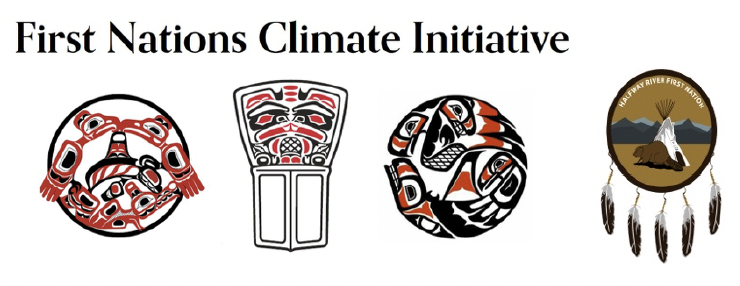




First Nations Climate Initiative to Bring Indigenous-Led Solutions to COP27
The Respective Territories of the Haisla Nation, Nisga’a Nation, Metlakatla First Nation and Halfway River First Nation, October 27, 2022 – Today, the First Nations Climate Initiative announced that it is joining the Government of Canada’s COP27 delegation at the global conference next month. The FNCI will be presenting its newly released Climate Action Plan, which lays out seven policy and investment proposals for achieving decarbonization and decolonization in tandem.
The Plan is designed to enhance federal and provincial government climate policies and programs, and to have significant impacts on GHG reductions locally and on an international scale. It also gives both levels of government a pathway to put climate and economic reconciliation into action together, consistent with the adoption of UNDRIP in Canada and provincially in B.C.
The FNCI delegation is presenting at the UN conference’s Canada Pavilion in Sharm El-Sheikh, Egypt on Day 3, November 8. Presenters include Darlene Hunter, elected Chief of Halfway River First Nation; David Myers, Technical Representative, Halfway River First Nation; Candice Wilson, Environmental Manager, Haisla Nation; and Alex Grzybowski, Pacific Resolutions Facilitator, First Nations Climate Initiative. Crystal Smith, elected Chief Councillor of the Haisla Nation, and Eva Clayton, elected President of the Nisga’a Nation, will present at the conference through pre-recorded remarks. These leaders and experts will take their place amongst other Indigenous leaders from around the world as knowledge holders with traditional and cultural values oriented towards protecting nature.
The FNCI’s goals at COP27 are to:
• Highlight that solutions focused on restoring the balance of nature for future generations are critical to overcoming the complex challenges facing First Nations, Indigenous Peoples and society at large
• Raise awareness of how First Nations-led climate action solutions and equity are needed for a just transition to net-zero
• Gain support for the policy and investment framework laid out in the Climate Action Plan, with a focus on energy transition and nature-based solutions as globally significant opportunities
• Participate in two-way knowledge sharing with Indigenous and non-Indigenous groups from around the world
A Just Transition for Indigenous Peoples
Though Canada is a wealthy nation, First Nations Peoples live with poverty and inequality every day.
The prosperity that exists today is due in great part to the exploitation of the abundance of natural resources in the traditional territories of Canada’s First Peoples. For generations, Nations have suffered the impacts of resource exploitation through deforestation, a decline in animal and plant species, watershed pollution and more. This has led to a loss of wild foods, medicines, cultural identity and traditional livelihoods, creating poverty and despair.
The FNCI is calling for the B.C. and federal governments to centre First Nations in the emerging green economy framework and enable them to be equity partners, in order to build economic resilience while protecting and restoring the ecosystems that are the foundation for Indigenous cultures and way of life; accelerating climate change mitigation and adaptation; and increasing the global impact of Canadian efforts.
Act Globally and Benefit Locally for a Shared Future
Reducing emissions in B.C. and Canada won’t solve the climate crisis. The FNCI recognizes that B.C. and Canada have the capacity to help other countries with much greater emission profiles to reduce their GHG emissions, and that this is a key strategy to recover the climate. Furthermore, First Nations have a central role to play in reducing emissions worldwide, by helping other countries switch from more GHG-intensive energy sources—such as coal—to cleaner fuels and ultimately zero-emission energy systems.
B.C. can have an outsized impact by leveraging its low-carbon advantages and emerging zero-emissions—and negative-emissions—energy systems to build energy and resource projects that are global leaders in climate management and mitigation.
The FNCI Climate Action Plan calls for federal and provincial governments to act globally to benefit locally by taking actions that:
• Promote exported Canadian resources as the most sustainable in the world
• Ensure that national and provincial climate plans include the global reductions that export resources provide through the benchmarking of other jurisdictions
• Engage in bi-lateral discussions, together with First Nations and Asian customers of Canadian low-carbon resources, to explore potential agreements that can accelerate emission reductions that can be shared under article 6.2 of the Paris Agreement as Internationally Traded Mitigation Outcomes
Acting to mitigate climate change both within Canada and internationally will create meaningful economic development for First Nations communities and make a greater contribution to climate action.
Nature Based Solutions Rooted in Traditional Environmental Stewardship
The FNCI is calling on the governments of B.C. and Canada to adopt a policy framework that expands carbon markets and streamlines financing for First Nations nature-based solutions projects, while also addressing the reconciliation imperatives of ecosystem protection and recovery, and economic self-determination for Indigenous peoples.
Nature-based solutions are a cornerstone in global efforts to mitigate climate change and they are a key opportunity for First Nations and other levels of Government to work together on a globally-significant scale through the protection and creation of carbon sinks.
The FNCI has worked with seven First Nations across northern B.C. who have identified eight million hectares in their traditional territories as places to implement nature-based solutions. The organization has identified buyers ready to purchase millions of tons of high-quality offsets—those that are verified, additional and credible—from First Nations nature-based solution projects in B.C.
Now, the FNCI Nations are calling on other governments to establish the regulatory framework to enable this to happen in order to achieve net-zero as quickly as possible.


